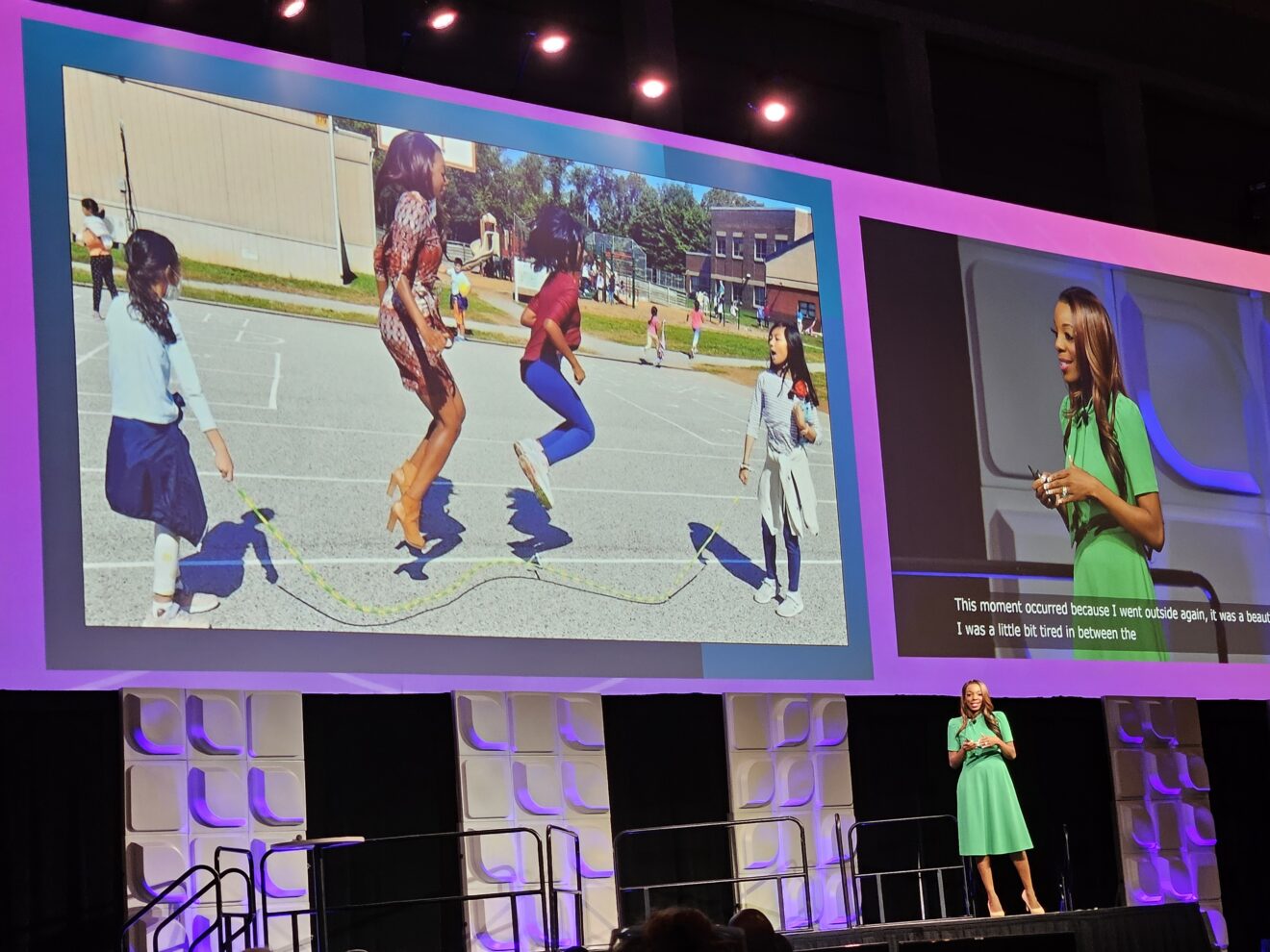The pandemic is largely behind us, but schools are still dealing with its aftershocks: chronic absenteeism, lagging student engagement and achievement, tense relationships with families and increased incidents of students acting out. So, how do you navigate this? How do you do the work of educating students when every day brings fresh, difficult challenges?
Waverly Elementary School Principal Rachel Edoho-Eket shared her formula for steering students, staff and families through uncertainty in her keynote presentation at ASCD 2024. Here are highlights from her talk.
Show up every day
Edoho-Eket’s educator journey began in the kindergarten classroom. Fresh out of college, she was excited to meet her students and their families. She organized a meet-and-greet, complete with coffee and cookies. She was eager to share her vision for the class.
Only one parent — a mother — showed up. Undaunted, Edoho-Eket launched into her presentation, outlining her plans and ideas for the year. The mother interrupted her.
“You know what? I don’t care about any of that. All I need to know is if you’re going to be here for my son or not,” she said.
The mother had reason to be concerned. The kindergarten class had one teacher and two substitute teachers before Edoho-Eket arrived in January. She was the students’ fourth teacher.
“Suddenly I understood exactly why she asked me if I was going to be there for her child or not,” Edoho-Eket said. “She had lost trust, and so did many other families in the classroom.”
Edoho-Eket assured the mother that she was committed to the school and the students. She spent the remainder of the year nurturing relationships with all of them and their families.
“I learned that if we’re going to build trust, we have to have positive relationships with people,” Edoho-Eket said. “We have to listen empathetically and we have to have that genuine commitment to show up for everyone that we serve every day.”
Hold onto joy
Edoho-Eket was a brand new principal when COVID-19 emerged on the global scene.
“I remember struggling greatly trying to understand how I could fill the demands of so many different people. The world was changing at such a rapid rate. It was honestly hard to keep up,” she said.
The situation caused her to reflect. What makes some educators stay in the field even as pressure mounts and the world falls apart around them? How do they remain committed to and enthusiastic about their work?
They embrace joy, according to Edoho-Eket. “Many of you were teachers or leaders during the pandemic and we are still here,” she said. “And despite those challenging times, it is the joyful moments that we can focus on to help us sustain ourselves in our most powerful roles.”
Edoho-Eket shared the story of a student named Selma, a fifth-grade student with special needs. Selma’s parents met with Edoho-Eket to discuss their daughter’s progress.
“I was struck by their advocacy and their sense of determination to ensure that we were doing everything that we could to help her be successful,” Edoho-Eket said. “Selma is a bright and determined student with a learning disability; she has a very unique learning profile. So we sat down together, and we collaborated on a learning plan that was going to meet her needs.”
Soon, with the support of Selma’s special-education teachers and the resources the school put in place, she began to thrive. Selma made progress and was promoted to sixth grade at the end of the school year.
These moments may seem insignificant but it’s critical that we remember them, Edoho-Eket said. They can sustain us during times of challenge and difficulty.
“[T]hose small and joyful moments really let us know that we can positively impact any student in any situation, regardless of the circumstances around us,” she said.
Build resilience
Educators must build resilience, according to Edoho-Eket. She outlined three steps for nurturing it.
First, we need a positive mindset. “As we are faced with challenges, it’s really important that we look at the positives and try to figure out how we can impact them in a meaningful way,” Edoho-Eket said. She urged audience members to consider how they respond when presented with a problem.
“Do you only see the negatives or are you able to see the opportunities?” she asked. “For us to be resilient teachers and leaders we have to be able to see the possibilities.”
Next, we need a strong support system – friends, family, colleagues, mentors. “Always tap into your support network. Because the work we do is hard. The work we do is meaningful. But sometimes the pressure feels overwhelming. So please always remember to tap into your supportive network.”
Finally, be adaptable as work continues to evolve. Edoho-Eket advised attendees to approach change proactively and communicate in a way that supports students, families and staff.
“[B]uild your resilience as the world of education continues to grow and change. We know that demands are coming,” she said. “They’re not going to take anything off the plates that are at this moment. And so it’s important that we’re able to be resilient.”
Kanoe Namahoe is the director of content for SmartBrief Education & Business Services.
